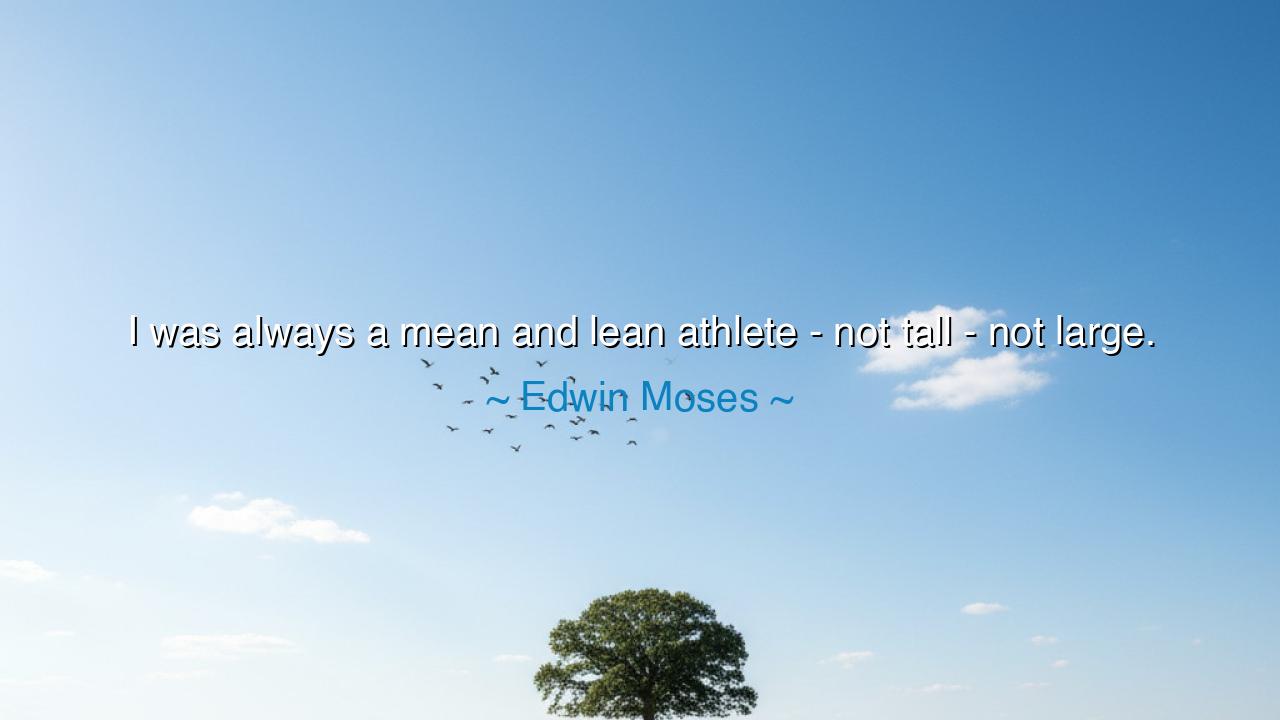
I was always a mean and lean athlete - not tall - not large.






Edwin Moses, the great hurdler whose stride once seemed to defy the very laws of time, declared: “I was always a mean and lean athlete—not tall—not large.” At first, these words seem but a description of his physical frame. Yet within them lies a far deeper lesson: that greatness is not found in sheer size or in brute strength, but in discipline, precision, and the unyielding will of the spirit. His legacy, carved across the lanes of Olympic tracks, proves that being lean is not a limitation but a weapon, and that being mean in spirit means being fierce in determination, not cruel in heart.
The heart of Moses’ statement lies in his defiance of expectation. In an age where the tallest and strongest are often exalted, he was neither. He did not tower above his rivals nor carry the mass of giants, yet he carried within him a sharpened will. He chose to refine himself, to strip away what was unnecessary, until what remained was speed, endurance, and flawless technique. Thus, his words remind us that success is not measured by appearance but by mastery—the honing of one’s gifts until they cut through opposition like a blade.
Consider Moses’ reign in the 400-meter hurdles: for nearly a decade, he was unbeaten, claiming victory after victory, often by wide margins. His dominance was not the fruit of towering size, but of relentless discipline. He studied the art of the hurdles with the mind of an engineer, calculating every step, every breath, until his rhythm became unbreakable. Where others stumbled under pressure, Moses glided, lean and relentless. His “meanness” was not malice, but the focused intensity of a man unwilling to yield an inch.
History offers us parallels to his truth. Alexander the Great was not the largest of men, nor did he command armies by sheer force of body. His greatness lay in his cunning, his precision, his ability to seize the smallest advantage and turn it into triumph. Likewise, Bruce Lee, slight in frame compared to many fighters, forged his body into something lean and efficient, moving with a speed and power that giants could not contain. Both, like Moses, proved that the world often mistakes size for strength, when true strength lies in refinement, agility, and will.
Moses’ words also carry an emotional weight for those who feel overshadowed by others. To be not tall, not large is to live in a world that often values what you do not possess. Yet Moses shows us that this is no curse—it is a call to forge a different path, to cultivate what others overlook. In his lean frame was the power of endurance; in his focused mind, the ability to dominate where others faltered. Thus, his statement is both confession and proclamation: what I lacked in size, I made up for in unbreakable will.
The lesson is clear: do not lament what you lack, but sharpen what you have. If you are not the largest, be the fastest. If you are not the strongest, be the most disciplined. If you are not the tallest, stand tallest in courage. For victory belongs not to the one who possesses everything, but to the one who uses what they have with mastery. This is the path Moses walked, and it is the path open to every soul who feels overlooked.
So I say to you: carry Edwin Moses’ words in your heart. Do not seek to be tall or large in body, but to be vast in spirit, fierce in determination, lean in discipline. Let your meanness be the fire of your will, and your leanness the sharpness of your craft. For the world will not remember those who merely looked strong, but those who proved, through relentless excellence, that true greatness is not a matter of size—but of soul.






AAdministratorAdministrator
Welcome, honored guests. Please leave a comment, we will respond soon